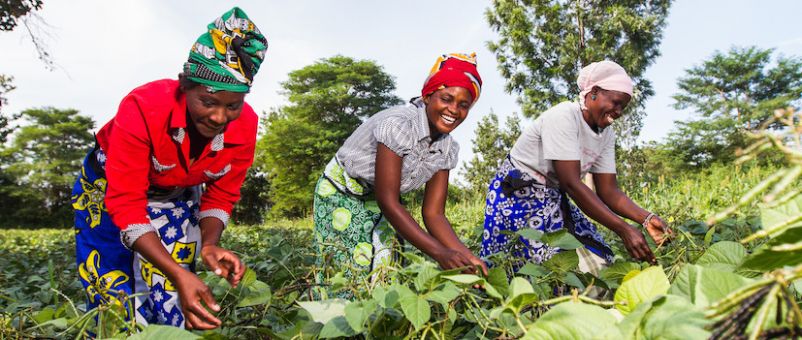Scaling Up Conservation Agriculture
Effective agriculture has the power to change lives. It underpins prosperity, food security and stability the world over. Farm Africa champions a holistic approach that boosts yields, protects the environment and connects smallholder farmers to thriving markets.


Overview of the project
Conservation agriculture (CA) is a combination of tested technologies and/or principles in agricultural production, and is gaining acceptance as an alternative to both conventional agriculture and organic agriculture as a means of ensuring sustainability.
The CA concept encompasses practices, such as mulch-based, no-till systems (known variably as zero-tillage or direct seeding,) and conservation tillage.
In no-till systems, soil disturbance is restricted to seed sowing, while conservation tillage involves some form of soil disturbance, e.g., strip-tillage, ripping and sub-soiling, ridging, and varied locally-adapted reduced tillage practices.
CA is a toolkit of agricultural practices that combines, in a locally adapted sequence, the simultaneous principles of reduced tillage or no-till; soil surface cover, and crop rotations and/or associations, where farmers choose what is best for them.
CA, as a concept for natural resource-saving, strives to achieve acceptable profits with high and sustained production levels, while concurrently conserving the environment. It is an approach that advocates the concept of sustainable intensification of production.
This research was conducted to assess socio-economic factors influencing adoption of conservation agriculture in the Moroto District of Uganda. The socio-economic factors, the level of conservation agriculture, and the constraints faced by the farmers were assessed.
Published research
05/1/2017-12/6/2019
Socio-economic and institutional factors affecting adoption of conservation agriculture:
The results revealed that factors that significantly affect adoption of CA were the gender of the farmer (p<0.05), access to credit (p<0.01), and extension services (p<0.01), while other factors were not significant.
- The gender of the farmers had a positive impact on adoption of CA, and it is statistically significant at the 1% level. As previously mentioned, 55% and 62.5% of the adopters and non-adopters were male respectively
- Access to credit was found to be significant (p<0.05), implying that farmers who have access to credit are more likely to adopt CA than those who do not
- Extension services show a positive correlation with adoption of CA and was significant at the 5% level
Demographic and socio-economic characteristics of the respondents:
Age of the respondents:
- The largest proportion (30%) of adopters of CA fell within the age range of 26 to 30 years old
- Furthermore, 15% of the adopters fell within the 21-25 age group, as well as the 36-40 age group
- There were no non-adopters falling in the age group of 41-50 years
- Among those who were in the 61 and above age category, 10% had adopted CA, while 5% had not
Educational level of the respondents:
- The findings show that the majority of adopters (65%) and non-adopters (77.5%) had not attained any formal education
- Only a small proportion (12.5%) of adopters and non-adopters (15%) had reached primary level
- The adopters who had acquired secondary education comprised of 22.5% of the sample
Gender of the respondents:
- 55% of the CA adopters were male, and 62.5% of the non-adopters were also male.
- Females were less well represented with 45% of adopters, and 37.5% of non-adopters.
- In general, the findings indicate that more males had adopted CA compared to their female counterparts.
Awareness of the famers about conservation agriculture:
- All of the adopters and three quarters of the non-adopters said that they were aware of CA.
- Only 25% of the non-adopters had not heard about CA.
Conservation agriculture principles being practiced by the farmers:
- 35% of the farmers were practicing crop rotation and retention of crop residues.
- A further 30% of the farmers were practicing minimum tillage.
Total size of land dedicated to conservation agriculture:
When the adopters were interviewed on the size of land they had dedicated to CA, the majority (82.5%) had allocated 1-5 acres of land for CA.
Constraints to using conservation agriculture:
- Limited information and knowledge was mentioned by CA adopters (12.5%) as a challenge during implementation of CA
- A lack of implements and inputs was recorded as a major challenge facing CA farmers by the largest proportion of CA adopters (30%)
- Out of the 40 adopter farmers who were interviewed, 7.5% mentioned difficulty in retaining crop residues to their fields after harvest
- Only 25% of CA adopters mentioned a lack of sufficient labour as one of the challenges they face. Since CA is a labour-intensive technology, this hinders the adoption of CA
It was funded by the European Union through a grant on enhancement of conservation agriculture
organisation
This research was conducted to assess socio-economic factors influencing adoption of conservation agriculture in Moroto District of Uganda. The socio-economic factors, the level of conservation agriculture, and the constraints faced by the farmers were assessed.
Farm Africa is an international organisation working to build a prosperous rural Africa:
- We help farmers to increase their harvests, build their incomes and sustain natural resources, partnering with governments and the private sector to find effective ways to fight poverty.
- We work closely with local communities, who actively participate in all the decisions about our work.
Our mission:
To promote sustainable agricultural practices, strengthen markets and protect the environment in rural Africa.
Our vision:
A resilient rural Africa where people and the environment thrive.
Our value:
- Expertise: Expertise and insightful evidence-based solutions are at the heart of everything Farm Africa does.
- Grounded: Our teams and partners work closely with local communities, engaging them in every level of decision-making.
- Impactful: We deliver long-lasting change for farmers, their families and the environments they live in.
- Bold: We model innovative approaches and are not afraid to challenge and reflect on strategies that are failing
One of the Organisations involved was Teso Development Organisation


